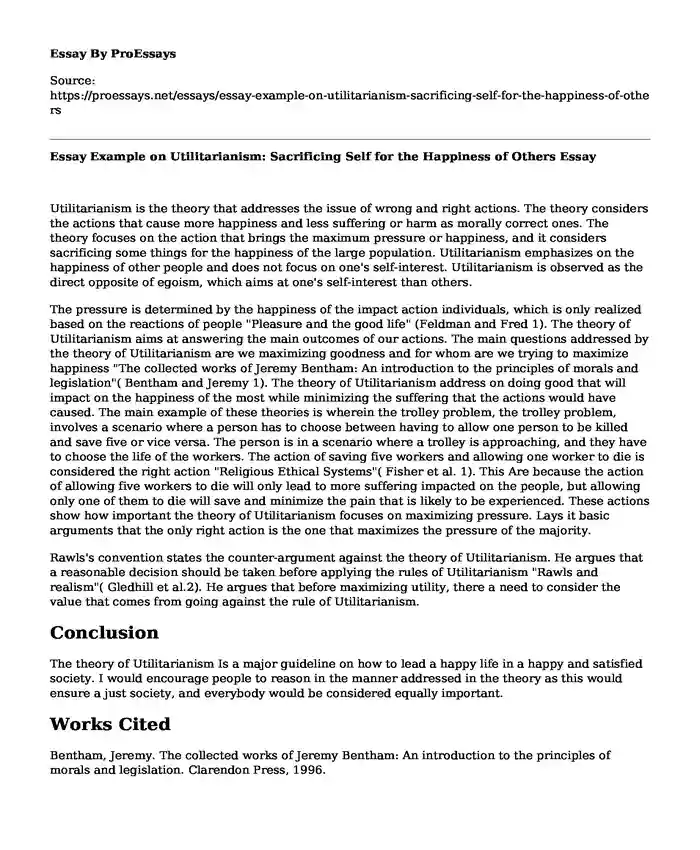Utilitarianism is the theory that addresses the issue of wrong and right actions. The theory considers the actions that cause more happiness and less suffering or harm as morally correct ones. The theory focuses on the action that brings the maximum pressure or happiness, and it considers sacrificing some things for the happiness of the large population. Utilitarianism emphasizes on the happiness of other people and does not focus on one's self-interest. Utilitarianism is observed as the direct opposite of egoism, which aims at one's self-interest than others.
The pressure is determined by the happiness of the impact action individuals, which is only realized based on the reactions of people "Pleasure and the good life" (Feldman and Fred 1). The theory of Utilitarianism aims at answering the main outcomes of our actions. The main questions addressed by the theory of Utilitarianism are we maximizing goodness and for whom are we trying to maximize happiness "The collected works of Jeremy Bentham: An introduction to the principles of morals and legislation"( Bentham and Jeremy 1). The theory of Utilitarianism address on doing good that will impact on the happiness of the most while minimizing the suffering that the actions would have caused. The main example of these theories is wherein the trolley problem, the trolley problem, involves a scenario where a person has to choose between having to allow one person to be killed and save five or vice versa. The person is in a scenario where a trolley is approaching, and they have to choose the life of the workers. The action of saving five workers and allowing one worker to die is considered the right action "Religious Ethical Systems"( Fisher et al. 1). This Are because the action of allowing five workers to die will only lead to more suffering impacted on the people, but allowing only one of them to die will save and minimize the pain that is likely to be experienced. These actions show how important the theory of Utilitarianism focuses on maximizing pressure. Lays it basic arguments that the only right action is the one that maximizes the pressure of the majority.
Rawls's convention states the counter-argument against the theory of Utilitarianism. He argues that a reasonable decision should be taken before applying the rules of Utilitarianism "Rawls and realism"( Gledhill et al.2). He argues that before maximizing utility, there a need to consider the value that comes from going against the rule of Utilitarianism.
Conclusion
The theory of Utilitarianism Is a major guideline on how to lead a happy life in a happy and satisfied society. I would encourage people to reason in the manner addressed in the theory as this would ensure a just society, and everybody would be considered equally important.
Works Cited
Bentham, Jeremy. The collected works of Jeremy Bentham: An introduction to the principles of morals and legislation. Clarendon Press, 1996.
Fisher, Andrew, et al. "Religious Ethical Systems." Phronesis (2019).
Feldman, Fred. Pleasure and the good life: Concerning the nature, varieties, and plausibility of hedonism. Oxford University Press on Demand, 2004.
Gledhill, James. "Rawls and realism." Social theory and practice 38.1 (2012): 55-82.
Freeman, Samuel. Rawls. Routledge, 2007.
Cite this page
Essay Example on Utilitarianism: Sacrificing Self for the Happiness of Others. (2023, Oct 26). Retrieved from https://proessays.net/essays/essay-example-on-utilitarianism-sacrificing-self-for-the-happiness-of-others
If you are the original author of this essay and no longer wish to have it published on the ProEssays website, please click below to request its removal:
- Allegory of the Cave vs. On Truth and Lies in a Nonmoral Sense - Philosophy Essay Example
- Use of Immoral Means in Politics in The Prince by Niccolo Machiavelli
- Ethical Analysis Related to Belief Essay
- The Aspect of Euthanasia in the Perspective Utilitarian and Kantian Analysis Essay
- Essay Example on Plato's Theory of Forms: Exploring the Good Life
- Essay Sample on Ethical Standards: A Guide to Doing Things Right
- Race & Identity: How Morality Influences Our Decisions - Essay Example







